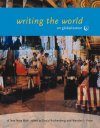Out of Print
By: David Rothenberg(Editor), Wandee J Pryor(Editor)
256 pages
Globalism as a global exchange of art and ideas: essays, memoirs, fiction, and poetry by writers including Arundhati Roy, Bill McKibben, and Naomi Klein
![Writing the World Writing the World]()
Click to have a closer look
About this book
Biography
Related titles
About this book
This collection of essays, memoirs, poems, stories, and artwork looks at globalization as a worldwide exchange of art and ideas. Writing the World focuses on the cultural realities of globalism – the opportunities it provides to learn from other cultures. This knowledge, argue David Rothenberg and Wandee Pryor in their introduction, can be power: "When all of us learn enough about our differences to respect the diversity that exists, we will be unable to pretend we are the same. We will never accept the old innocence and ignorance bred by oppression and exploitation." For the contributors to Writing the World, to dream of the global village is to see the world not as a vast market but as a place of shared values and linked wonder."It is time to listen to the many literate voices the world speaks," say Rothenberg and Pryor. The voices of Writing the World range from Arundhati Roy on the "colonization of knowledge" in her essay "The Ladies Have Feelings, So... Shall We Leave It to the Experts?" to Naomi Klein's meditation on fences, ownership, and property. They include Bill McKibben on women farmers in Bangladesh, Hannes Westberg's account of being shot by Swedish police at a demonstration, James Barilla on invading and indigenous plant species in "The Aliens in the Garden," and many other vivid, compelling, and provocative writings that celebrate – and illustrate – "the poetry of cultural contact." Artists and photographers whose work appears in Writing the World: On Globalization include Adam Clayman, Jenny Matthews, Richard Robinson, and Arpita Singh.
Customer Reviews
Biography
David Rothenberg is Professor of Philosophy at the New Jersey Institute of Technology and founder of the Terra Nova book series. His most recent books are Always the Mountains and Sudden Music: Improvisation, Art and Nature.
Wandee J. Pryor is former Managing Editor of Terra Nova projects at the New Jersey Institute of Technology.
Out of Print
By: David Rothenberg(Editor), Wandee J Pryor(Editor)
256 pages
Globalism as a global exchange of art and ideas: essays, memoirs, fiction, and poetry by writers including Arundhati Roy, Bill McKibben, and Naomi Klein
"There is no gainsaying this book's effectiveness in showing how the global has infiltrated the residences and interiorities of almost all lives on the planet. The personal narratives that comprise so many of the pieces gathered here bring the global very close to 'home,' to the domain of individual lives and daily experience, even when the reference is to places very distant, such as Zambia, Bangladesh, or New Guinea."
– Giles Gunn, Professor of English and of Global and International Studies, University of California, Santa Barbara
"This volume provides a fresh approach to globalization by viewing it through the diverse lens of prose and poetry from around the world. We can actually see ourselves as part of a global village as we wind our way through the literary alleys of north and south, east and west. A contribution indeed, one that can be read with profit both by those in the halls of power and those outside."
– Mary Evelyn Tucker, Professor of Religion, Bucknell University




































